To empower stroke survivors to engage with their care, Cognitant, in partnership with University College London Hospitals (UCLH), identified a need for a new digital health companion that can support patients following discharge from acute care. This ultimately led to the conception of My Stroke Companion.

My Stroke Companion is an accessible digital health companion providing personalised, reliable and localised information about type of stroke, post-stroke care plans (including prescribed medicines and rehabilitation), local support provision, lifestyle changes, driving, work, finances and sex and relationships.
With a minimalistic, easy-to-use layout, the formats and functions of this digital health companion include:
- separate versions for stroke survivors and caregivers
- explainer videos and visual content
- easy read downloads
- text-to-audio
- links to further high-quality and trusted information sources
- health goal-setting, logging of health data and tracking of health trends
- translations of all content into Arabic and Polish
- personalised by clinicians through the completion of a checklist on Healthinote
Co-creation is essential for optimising all health education and support materials. To deliver My Stroke Companion, we followed our four-step co-creation process: Discover, Define, Develop and Deliver/Evaluate.
Discover: The unmet needs of stroke survivors, their caregivers and family members were explored through an intensive 6-week market research phase.
Define: Potential digital health companion content, formats and functions were presented to and critiqued by clinicians, patients and their family members via focus groups, 1:1 interviews and surveys.
Develop: An iterative design process was followed, with clinicians, patients and their family members continuing to be consulted at key steps during development, before the final build was agreed on with key stakeholders.
Deliver/Evaluate: Following an initial pilot and further iterative development of My Stroke Companion, a feasibility study explored its accessibility and usability. The digital health companion will be further developed in the future, based on these learnings and as more user feedback is gathered and processed.
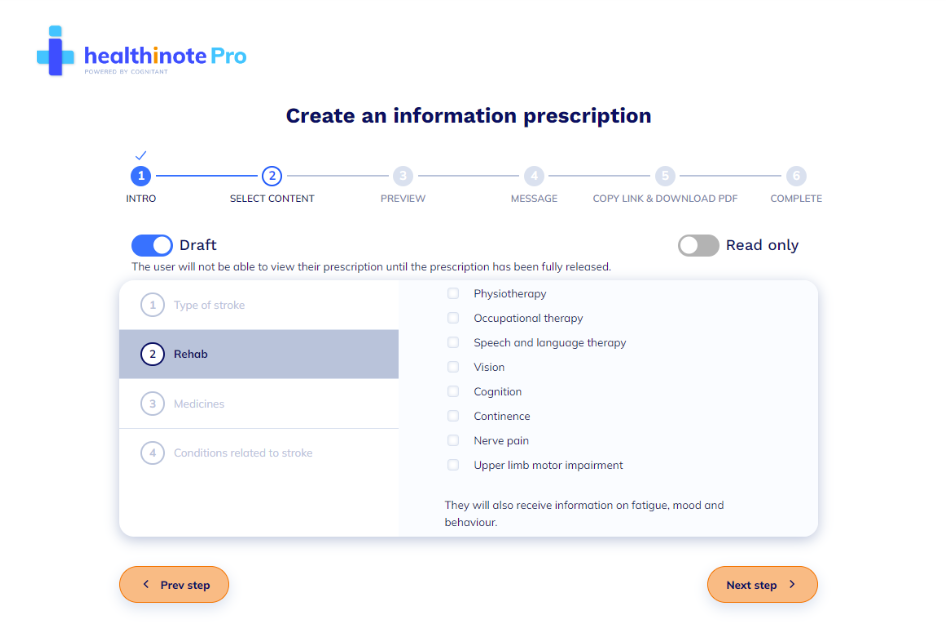
Feasibility study
Methods
Five UK NHS hospitals prescribed My Stroke Companion to stroke survivors at discharge over an 8-month period. Platform engagement and optional, anonymous, in-hub feedback surveys were analysed. Surveys included questions on the usefulness, accessibility and usability of the digital health companion, as well as intended future frequency of use.
Key results
Clinicians generated 504 prescriptions across the five NHS sites, with 400 users subsequently accessing My Stroke Companion 555 times. The average session duration was 6 minutes.
Of those who accessed My Stroke Companion, 42 stroke survivors and 26 caregivers completed the optional survey.
Among stroke survivors, 31% self-reported a ‘good’ or ‘excellent’ understanding of stroke before accessing the digital health companion, compared to 88% after accessing the platform. Feedback also indicates increased knowledge in all domains, including medicines, rehabilitation, accessing support and preventing further stroke. These findings were similar among the caregiver cohort. (Figure 2).
Personalisation of the content was a key feature of the digital health companion, with 81% of stroke survivors feeling that the content was suitably tailored to their needs. When questioned on the accessibility and usability of My Stroke Companion, 81% of stroke survivors and 93% of caregivers felt that the platform was ‘fairly’ or ‘extremely’ easy to use and navigate. 91% of stroke survivors and 92% of caregivers felt that the content was easy to understand. Overall, satisfaction levels were high among those that completed the survey, with 91% of stroke survivors and 85% of caregivers being ‘somewhat’ or ‘very’ satisfied with My Stroke Companion. (Figure 3).
Regarding future use of the digital health companion, 83% of 42 stroke survivors and 84% of 26 caregivers said that they would be likely to use My Stroke Companion in the future.
Stroke knowledge before and after accessing My Stroke Companion
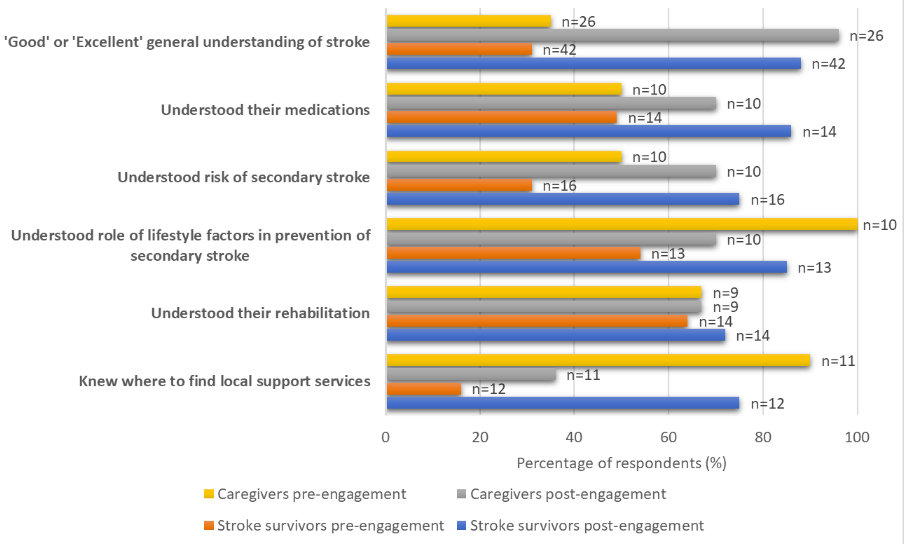
Usability and accessibility of My Stroke Companion
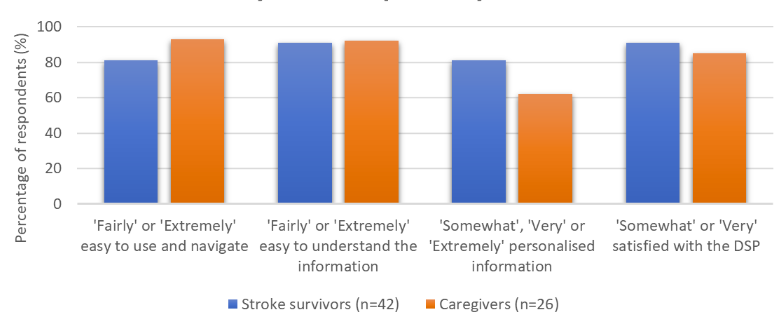
Learnings and future directions for My Stroke Companion
Having been successfully rolled out across five NHS stroke centres in the UK, My Stroke Companion is the first personalised digital health companion that supports stroke survivors and their families in the UK. Wider rollout and continued iterative development of the platform will ensure that the needs of stroke survivors and their families are met through appropriate information provision, in the right formats, at the right time.
My Stroke Companion is the only available stroke information solution embedded within the stroke pathway that curates content into one platform, enabling clinicians to create personalised digital health companions for each patient tailored to their region, language, diagnosis and care plan.
The results of the feasibility study suggest that providing multiformat, digital, personalised content to stroke survivors and their families can have a meaningful impact on their ability to understand and engage with their care plans. Our ambition is to put My Stroke Companion at the fingertips of all UK stroke survivors, empowering them to take more control over their personal health whilst providing efficiency savings to NHS Trusts.
Looking beyond the UK, there is growing international demand for personalised, digital health information that can help patients self-manage their conditions, tackle health inequalities and deliver efficiencies to health systems. My Stroke Companion could feasibly be adapted to and implemented in various health systems. Having been developed in multiple languages, further translations may easily be deployed as necessary. While the UK remains the focus of our attentions in the immediate future, the international potential of this digital health companion is clear for all to see.
For now, the iterative development of My Stroke Companion continues, with rich feedback to process and act on from a wide range of stakeholders. Key areas of focus include:
- ensuring information remains topical and up to date
- continuing to fill gaps in information provision
- enhancing accessibility of My Stroke Companion, so that it is usable and impactful to all
- providing new and improved features to help patients stay on top of their health
- streamlining the integration of the programme with clinical care pathways
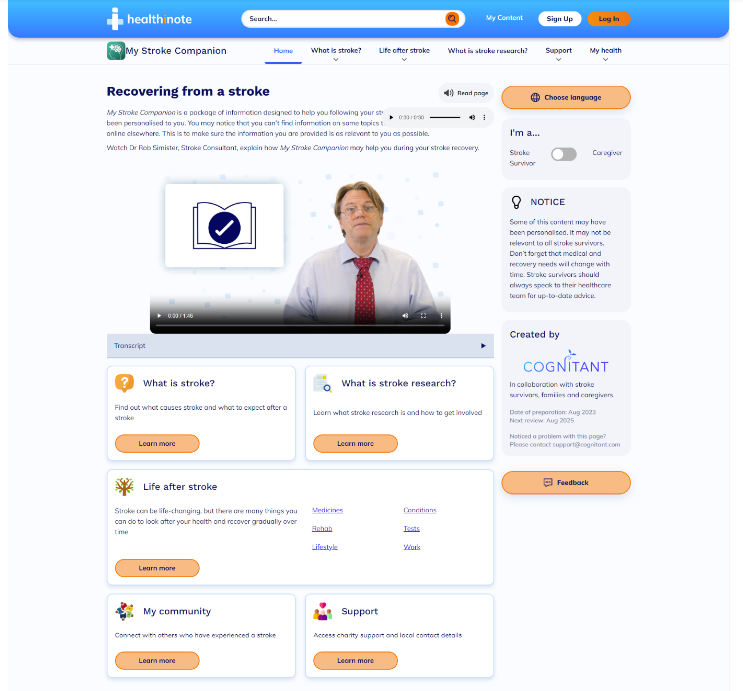
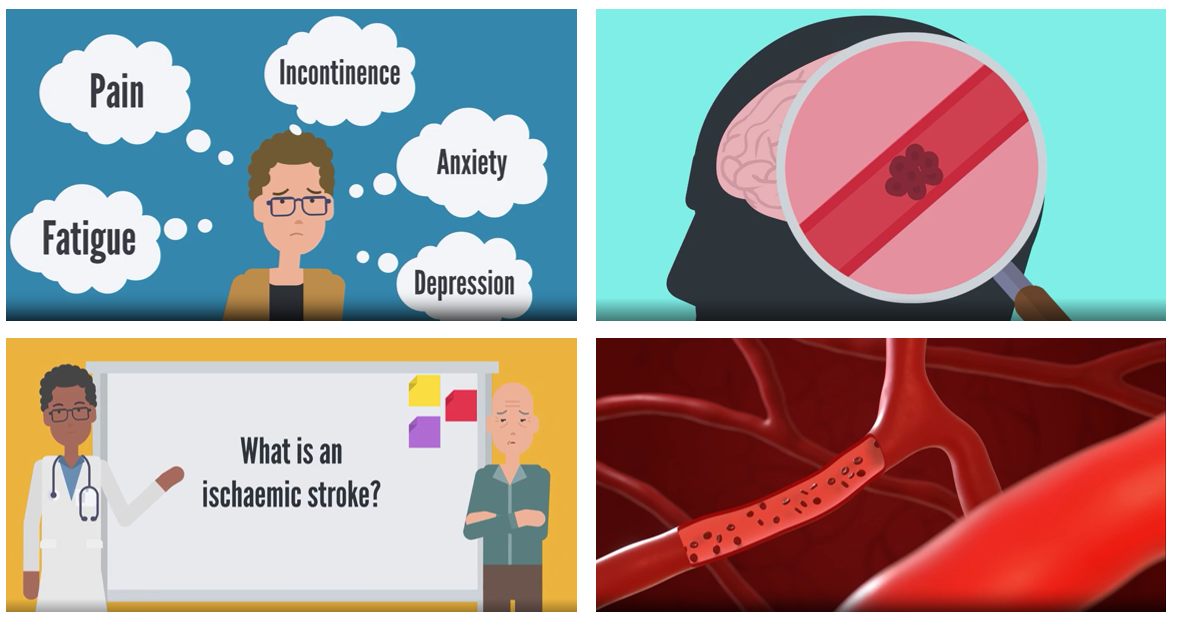
Acknowledgements
We extend our deepest gratitude to everyone involved in the co-creation and evaluation of My Stroke Companion. This initiative would not have been possible without the invaluable contributions of healthcare professionals, charitable organisations (Headway, Different Strokes, the Stroke Association and Same You), stroke survivors and their caregivers.
Special recognition goes to our primary development partner and recruitment site, University College London Hospitals (UCLH). We are particularly grateful to Dr Rob Simister, Principal Investigator and Clinical Lead of the UCLH Comprehensive Stroke Service, for his leadership, dedication and unwavering support throughout this project.
References
- Stroke Association. Stroke statistics. Available at: https://www.stroke.org.uk/stroke/statistics. Accessed July 2024
- Marshall I et al. Stroke pathway — an evidence base for commissioning — an evidence review for NHS England and NHS Improvement [version 1; peer review: 2 approved with reservations]. NIHR Open Res 2022;2:43
- Knight K et al. The provision of health information to stroke patients within an acute hospital setting: what actually happens and how do patients feel about it? Top Stroke Rehabil 2006;13(1):78-97
- O’Connell et al. The educational needs of caregivers of stroke survivors in acute and community settings. J Neurosci Nurs 2003;35(1):21-8
- Mohd Z et al. A review of risk factors for cognitive impairment in stroke survivors. Sci World J 2016;2016:3456943
- Veroff D et al. Enhanced support for shared decision making reduced costs of care for patients with preference-sensitive conditions. Health Aff (Millwood) 2013;32(2):285-93
- NHS. The NHS Long Term Plan. Available at: https://www.longtermplan.nhs.uk/. Accessed July 2024
- NHS. Health literacy. Available at: https://service-manual.nhs.uk/content/health-literacy. Accessed July 2024
- Rowlands G. A mismatch between population health literacy and the complexity of health information: an observational study. BJGP 2015;65(635):e379-86
- Office for National Statistics (February 2018). English language skills. Available at: https://www.ethnicity-facts-figures.service.gov.uk/uk-population-by-ethnicity/demographics/english-language-skills/latest. Last updated March 2024
Cognitant
Looking to empower people with health information for better patient outcomes?
Related News
Kidney Research UK invests in Healthinote patient education platform which could support >15m people with long term health conditions
April, 2025
Oxford, January 2025 – Kidney Research UK, the leading charity dedicated to kidney health, has made a significant investment in Cognitant Group Ltd, a leading...
Webinar Insights – Compliance vs Patient Engagement: Can They Co-Exist?
April, 2025
Is compliance really a barrier to meaningful patient engagement in pharma, or are outdated myths holding us back? In this recent webinar, Dr Tim Ringrose,...
Funding awarded to innovations that support early diagnosis and rehabilitation of Stroke patients
March, 2025
SBRI Healthcare, an Accelerated Access Collaborative (AAC) initiative, in partnership with the Health Innovation Network, has awarded £2.5 million for the development of five innovations...